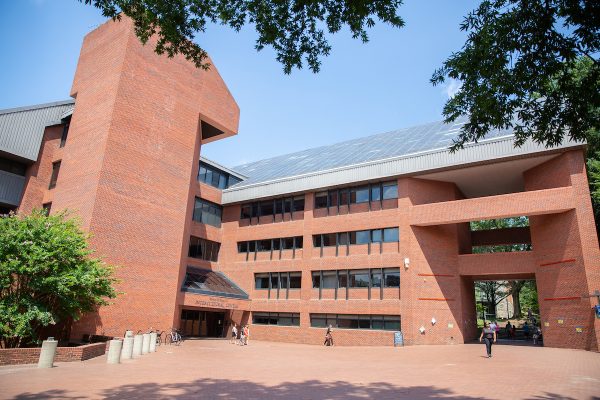Georgetown University Faculty and Staff for Justice in Palestine (GUFSJP) highlighted displaced populations in Gaza during a showcase of two short films and a discussion between the director and several experts Jan. 17.
Rehab Nazzal, a Palestinian-born multidisciplinary artist, directed the films “Canada Park” and “Vibrations from Gaza,” which explore the displacement of populations from three villages in the West Bank and the challenges faced by deaf children in Gaza, respectively. GUFSJP, an organization of faculty, staff and graduate students who advocate for Palestinian rights, joined the Prince Alwaleed Bin Talal Center for Muslim-Christian Understanding (ACMCU), which seeks to foster interreligious dialogue, the department of Arabic and Islamic studies and the disability studies program to co-host the event and subsequent discussion.
Theodora Danylevich, moderator of the event and adjunct professor in the English department and department of women’s and gender studies, said the intersection of disability and war is a present theme throughout both films.
“In the film, we are informed that the 18 individuals who perished with the villages in the first film were elderly and disabled people who couldn’t leave their homes,” Danyelevich said at the event. “And I just find that so devastating.”
Nazzal said “Canada Park,” a 2019 documentary that focuses on three Palestinian villages that were occupied by Israel in 1967 and demolished after Israel forcibly expelled 10,000 residents in 1973, serves as a reminder of the tragedy’s importance.
“I made this film to keep the memory alive,” Nazzal said at the event. “I wanted to connect the testimonies that I gathered to the horrors that the Palestinians have been enduring since the 1940s, since the first genocide and ethnic cleansing.”
Timothy Y. Loh, an anthropologist on the panel whose research investigates language and religion in deaf and signing spaces globally, said the power behind the film comes from scenes illuminating the children’s strength and purpose.

“What I was also struck by in the film was the insistence that these deaf children that you interviewed had to live, to continue to live regardless,” Loh said. “And I think that that actually is one of the big thrusts of disability studies.”
“Canada Park” features the testimony of a former resident of one of the towns demolished in 1973, while the 2013 short documentary “Vibrations from Gaza” shares the experience of deaf children living in the Gaza Strip in the context of bombings.
Nazzal said the bombings also affect deaf children because they can feel the vibrations, which she tried to mimic in the film.
“The sound of drones — when you’re sitting in the cinema — is so irritating for the audience,” Nazzal said. “I want it to irritate because I just want the people to imagine how people in Gaza are hearing this for 17 continuous years, day and night.”
Loh said “Vibrations from Gaza” highlights important issues for deaf people that are amplified in Gaza.
“I was really impacted by the importance of language and the language barrier, I guess, between many deaf Palestinians and their families and other people,” Loh said.
Loh added that the film displays the realities of living with a disability, specifically during times of war.
“The world is not accommodating and it’s not made for a lot of folks with disabilities, and they have to find all these strategies to navigate a world that’s not built for them,” Loh said. “I think that we see this in a really powerful way in this film.”